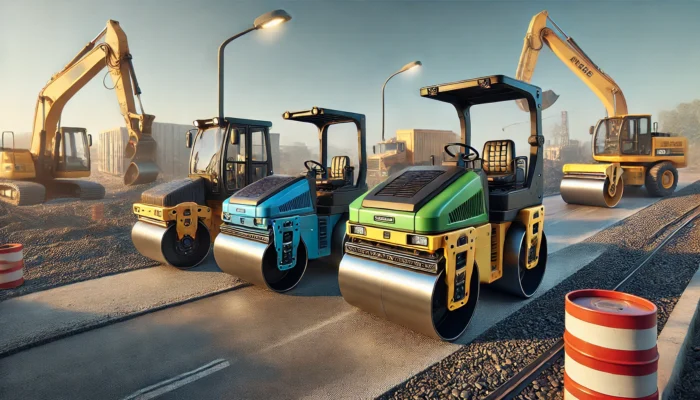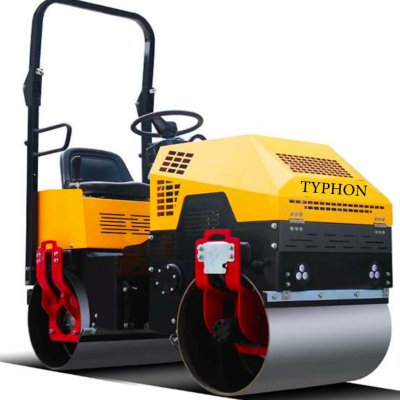Construction, Construction and Landscaping, Excavator, Mini Road Roller, Mini-Excavator, TYPHON Machinery
Choosing the Right Mini Road Roller
Selecting the right mini road roller is essential for maintaining roads, pathways, or compacting surfaces efficiently. Mini road rollers come in various sizes and configurations, making it somewhat challenging to decide which is best suited for your needs. If you’re purchasing from Typhon Machinery or using USA Excavators, the key factor is to choose a roller that fits your project’s specific requirements. Below, we provide an overview of the most important aspects to consider when selecting the right mini-road roller.
1. Understanding the Size and Scope of Your Project
The best way to choose the right mini road roller is by analyzing the project you’re working on. The size and surface type you need to compact will influence your choice.
- Small Projects (Pathways, Gardens, or Small Yards): For small-scale jobs like compacting pathways or garden areas, you don’t need a large or heavy machine. A mini road roller with a smaller drum size will be ideal, as it offers more precise control and can fit into tight spaces.
- Recommended Types: 1-ton roller, electric roller.
- Why: These rollers are light, easy to manoeuvre, and designed for smaller surfaces or limited spaces.
- Medium Projects (Driveways, Small Construction Sites): If you’re working on a medium-sized project like a driveway or a small construction site, a self-propelled mini road roller with more power would be more effective. These rollers provide the compaction force needed for a bit more complex work.
- Recommended Types: 2-ton roller, gas-powered roller.
- Why: These models provide more compaction power and can handle medium-sized areas with varying surfaces.
- Large Projects (Roads, Parking Lots): For larger projects, such as compacting roads or parking lots, you’ll need a more powerful roller. A riding mini road roller or one with a larger drum will ensure the job gets done faster and more efficiently.
- Recommended Types: 3-ton roller, diesel-powered roller.
- Why: These rollers save time and effort by covering large areas and providing optimal compaction.
2. Considering the Type of Mini Road Roller
Once you’ve determined the size and scope of your project, it’s crucial to decide on the type of mini road roller to purchase. Here are the common types to choose from:

- Electric Mini Road Roller: Electric rollers are environmentally friendly, quiet, and cost-effective. They are best for small to medium-sized projects and are ideal in areas where noise and emissions are a concern.
- Best for: Small to medium projects, quiet zones.
- Pros: Silent, low emissions, low maintenance.
- Cons: Less powerful than gas or diesel models, limited by battery life.
- Gas-Powered Mini Road Roller: Gas-powered rollers are more powerful than electric ones and are suitable for compacting tougher surfaces. They offer flexibility for medium to large projects.
- Best for: Medium to large projects with mixed terrain.
- Pros: Powerful, and versatile for different surfaces.
- Cons: Requires more maintenance, fuel refills, and produces emissions.
- Diesel-Powered Mini Road Roller: Diesel-powered rollers are designed for heavy-duty projects. They provide maximum compaction force, making them ideal for large surfaces like roads or parking lots.
- Best for: Large-scale projects requiring intense compaction.
- Pros: Extremely powerful, long operational time.
- Cons: Higher maintenance, noise, and fuel costs.
3. Drum Size and Compaction Force
The drum size and compaction force are critical when selecting a mini road roller. These factors determine how efficiently the roller will compress the surface.
- Small Projects: A mini road roller with a drum size of 20-28 inches and lighter compaction force is ideal for smaller areas.
- Medium Projects: A drum size of 28-35 inches will provide better compaction for medium surfaces like driveways or small construction sites.
- Large Projects: For large areas like roads, a drum size of 35 inches or more is recommended to maximize compaction efficiency.
4. Maneuverability and Additional Features
Manoeuvrability is essential when working in tight spaces or on uneven surfaces. Many mini road rollers come with features to enhance user control:
- Self-Propelled Rollers: These make it easier to operate the roller on slopes or rough terrains, reducing the physical effort required.
- All-Wheel Drive: Provides better traction on uneven surfaces, making the job more efficient.
- Vibration System: A roller with a vibration system can increase the compaction force, making it ideal for denser materials like asphalt or concrete.
5. Maintenance and Durability
When choosing a mini road roller, consider the maintenance needs and durability of the machine:
- Durability: Look for machines with robust construction, especially if you’ll be using them for heavy-duty tasks.
- Maintenance: Regular maintenance, such as checking the engine, oil, and hydraulics, is necessary to keep the roller in optimal condition.
Conclusion
Choosing the right mini road roller depends on your project’s size, the type of surfaces you’ll be compacting, and the features you need for efficient operation. Whether you’re working on a small garden path or a large road project, Typhon Machinery and USA Excavators offer high-quality mini road rollers that meet your specific needs. Remember to consider the size, power, and additional features to ensure you get the best machine for your job.

